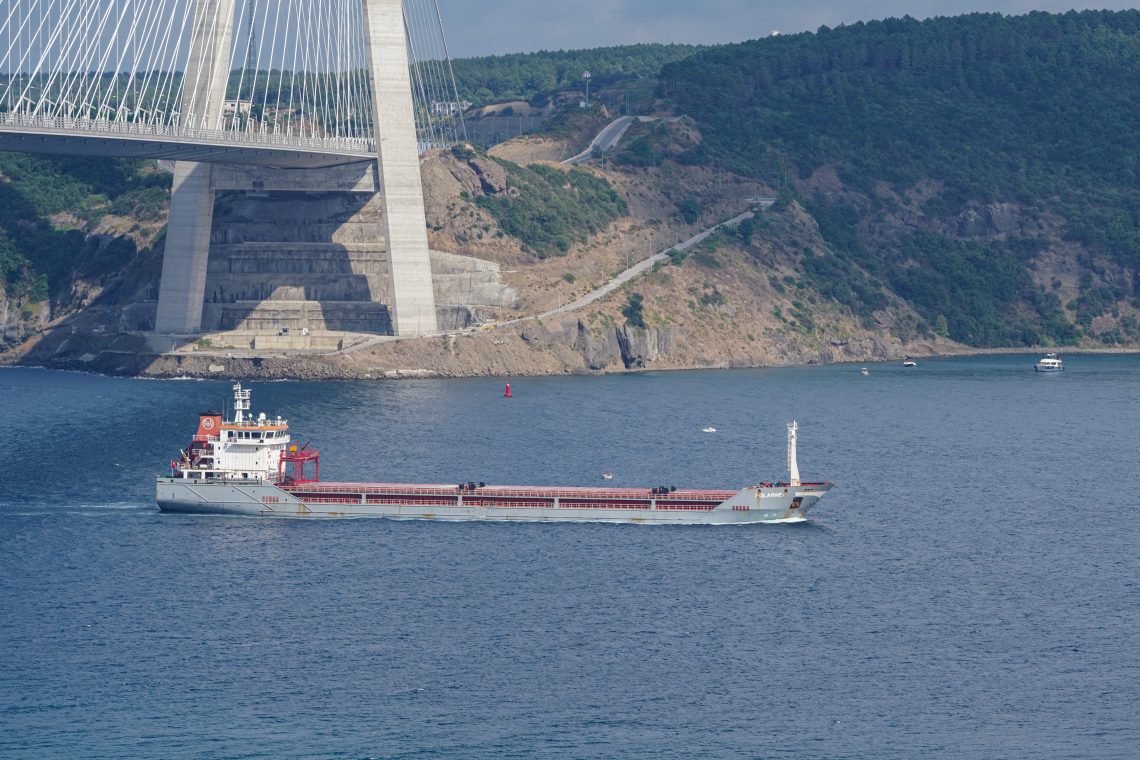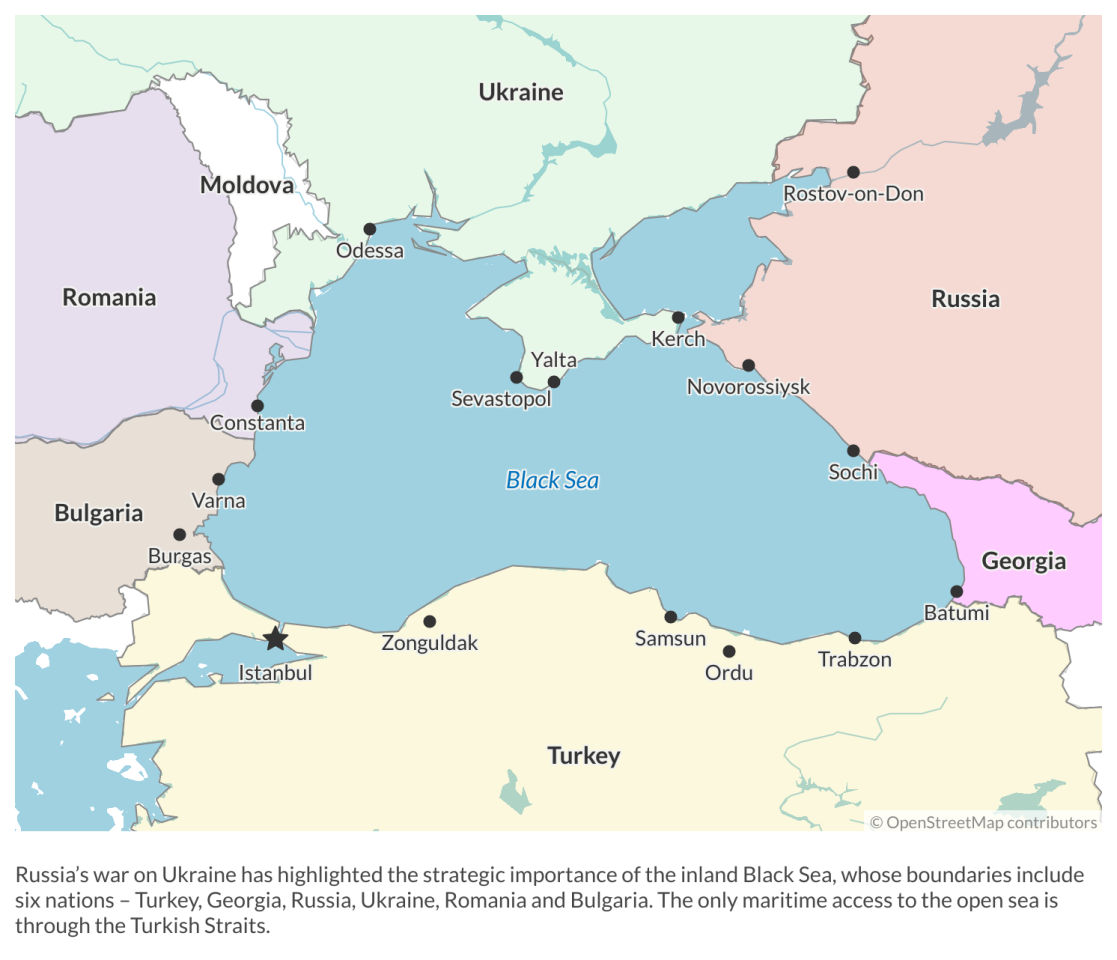The contest over the Black Sea in the new Cold War
Russia’s recent blockade of Ukraine’s ports underscores the importance of the Black Sea and the need for NATO to counter the Kremlin’s maritime military dominance.

In a nutshell
- Russia’s war on Ukraine highlights the Black Sea’s importance
- Turkey plays a vital gatekeeper role in the passage of warships
- NATO has a strong interest in countering Russian domination
The Black Sea region will become much more militarized and contested in the future. There is no chance that Turkey would ever surrender its privileged authority under the Montreux Convention of 1936 to block the right of military vessels to enter the Black Sea through its straits during wartime. Yet other NATO nations will be more aggressive in seeking to control air and maritime space. Expect the increased deployment of capabilities by NATO forces to deny access to hostile forces.
Changing times
The NATO Strategic Concept unveiled in Madrid on June 29 highlighted the necessity of strengthening NATO’s forward defensive posture, particularly singling out the Black Sea. This development is unsurprising given Russia’s war on Ukraine. The NATO consensus is that Russian strongman Vladimir Putin’s ambitions reach beyond Ukraine’s borders and have the potential to destabilize Europe.
NATO’s northern flank will be significantly strengthened if both Finland and Sweden join the alliance. In addition, the forward defense of Central Europe continues to gather more attention. That leaves NATO’s southern flank, traditionally an area that has seen less emphasis due to differing threat perceptions, lack of political consensus and the difficulties of addressing security challenges and navigation in the Black Sea.
The war against Ukraine has sharpened attention on Black Sea security. In particular, the Russian blockade of Ukrainian grain exports is worrisome for its potential harm to food supplies worldwide. In July, about 130 cargo ships were waiting at the maritime border with Ukraine in Romanian waters to dock in Odesa and load up on grain. On July 22, a four-way agreement among Turkey, Ukraine, Russia and the United Nations led to the first movement of cargo ships out of Ukrainian ports on August 1.
Yet, even before the war, influential voices in the Western security community argued for more robust action by NATO members. Notable influencers included retired U.S. Lieutenant General Ben Hodges, Luke Coffey at the Hudson Institute and Slawomir Jan Debski, the Polish Institute of International Affairs director.
Romania has been the most vocal advocate for renewed attention on Black Sea security issues. In addition, other nations that could be affected by future competition – including Moldova, Georgia, Azerbaijan, and Bulgaria – have also been more vocal. All share a common interest in getting the U.S. more actively engaged in regional affairs.
Facts & figures
The shape of things to come
Beyond energy, maritime transport and regional security will drive competition and cooperation in the Black Sea region. Among the other inescapable realities is that dominating the Black Sea is part of Russia’s “counter-encirclement” strategy. Weakening NATO’s position in the region is also important for China’s plans to expand its scope of influence in Europe and North Africa.
Dominating the Black Sea is part of Russia’s “counter-encirclement” strategy.
Turkey will not deviate from its policy of steering a middle course of maintaining its relationship with Russia while remaining in good standing as a NATO member. Ankara will continue what it sees as its stewardship role in ensuring free and open access for Black Sea commerce even after the war in Ukraine ends. The Montreux Convention, which gives Turkey the right to restrict warships from entering the Black Sea while leaving commercial traffic unrestricted, will likely continue unchallenged.
Americans over there
One pivotal factor in future developments in Black Sea security will be the degree to which southern European nations can engage the U.S. in regional security. Central Europeans have already been courting a deeper U.S. involvement in the Three Seas Initiative on developing regional infrastructure, which includes Romania and Bulgaria. There has also been some discussion of expanding the initiative into “Three Seas plus nations” to include countries that are not members of the European Union, such as Ukraine, Georgia, and Moldova. Realizing this expansion could well require more U.S. engagement and support.
Podcast: The future of Black Sea geopolitics
Recently, a bipartisan group in the U.S. Senate introduced draft legislation on a U.S. assistance plan for the Black Sea, which included both NATO and non-NATO members. “It is an important bipartisan legislative initiative that should define the U.S. strategy for the Black Sea region,” declared Georgian ambassador to the U.S. David Zalkaliani. He called it “the first time that the U.S. Senate addresses the administration to develop a strategy for the Black Sea region.”
The most likely scenario is that NATO nations will boost their influence by fielding capabilities to blunt Russian military force.
The Senate proposal does portend a broader bipartisan U.S. effort to engage in the region. That said, with the U.S. administration’s current preoccupation with Ukraine and domestic issues, the U.S may not be able to move quickly.
That Black Sea competition is also linked to countering Chinese influence in Europe may strengthen the momentum for deeper U.S. engagement. The question is, how fast?
Scenarios
Given that the Montreux Convention will remain unchanged, the most likely scenario is that NATO nations will boost their influence by significantly fielding anti-access capabilities to blunt Russian military force. The boost will include Black Sea air policing, similar to the Baltic air policing operation, and significant deployment of anti-ship missiles, anti-submarine capabilities, anti-mining efforts and dramatically increased air and maritime situational awareness.
Russia will most likely seek to counter these efforts with a variety of gray-zone tactics, including adversarial information campaigns, bribing defense and political officials and other tactics to forestall or limit deployments or operations. Simultaneously, it will continue to seek an expansion of military dominance in the Black Sea.
The wild card in this scenario is how ambitious NATO plans for the southern flank will evolve over time. NATO could expand the scope of activities to include the Eastern Mediterranean Sea, an effort that would also threaten Russian and Chinese influence in the Middle East and North Africa.
Another wild card is the extent to which the U.S. seeks to deploy naval forces in the region on a permanent basis.
Finally, it bears watching to what degree the transatlantic community supports Ukraine’s need to clear and secure its coastal waters from the Romanian border to Odesa at a minimum. The scope of this effort and its success or failure could have long-term consequences on the willingness and ability of NATO to challenge Russia in the Black Sea.








